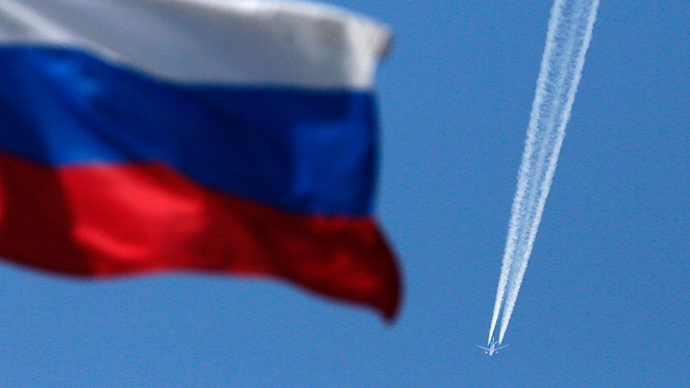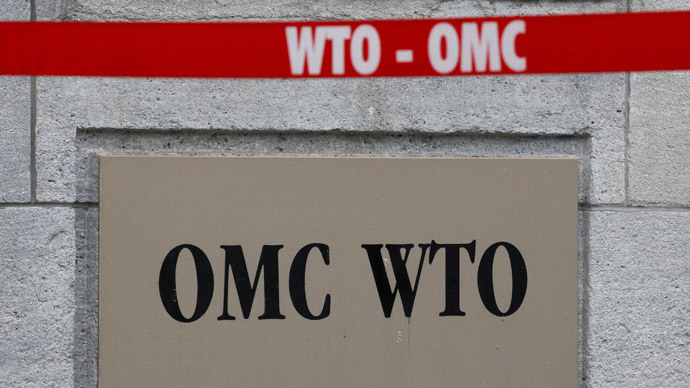Sanctions war between Russia and West a bad idea

Until recently sanctions in the world of international law were regarded as a bit passé. Not only did they fail to achieve their objective, they also proved to be a very fast way to impoverish innocent people; a blunt instrument that did no one any good.
Thus it is with some bemusement that we wake up in a world where everyone is slapping sanctions on everyone else. It’s like a last wild sanction party, and it's been even weirder than all that went before.
It started with the US, Canada and the EU placing sanctions on a variety of Russian banks and energy businesses, such as Rosneft, Novatek and Gazprombank, as well as asset freezes and visa bans on individuals thought to be close to Russian President Vladimir Putin. Originally related to Russia’s annexation of Crimea earlier this year, the ever-increasing sanctions are now linked to Russia’s alleged support for separatists in Eastern Ukraine.
Russia has responded by imposing import bans on agricultural products originating in North America and Europe. It has also announced its intention to take the case to the World Trade Organization, bringing the dispute into the legal realm. While Western countries claim that they are permitted to sanction Russia under WTO rules, Russia counters that the sanctions are illegal under WTO law and that it is permitted to impose import bans as a retaliatory measure.
But law depends on more than just claims and counter-claims. It depends on… law. So what is the law at the WTO and how could it be applied to this case?
What happens at the WTO?
The lengthy WTO agreements are all aimed at one goal: eliminating restrictions on international trade. The basic rule of the organization is that all WTO members must treat all other WTO members equally. This is the most-favored-nation clause (‘the MFN’): what you give to one, you must give to all. A country cannot suddenly withdraw a trading privilege from another WTO member out of convenience.
In order to enforce this basic rule, the WTO was endowed with its own quasi-judicial system of “panels” that would resolve trade disputes between states. These panels are composed of experts in international trade law and they function in a manner similar to a court. WTO panels have decided on literally hundreds of cases and the vast majority of them have been resolved. The reason the panel system works so well is that if a state breaches trade rules any other state that suffers harm through that action is allowed to retaliate. For example, if Japan were to refuse to import Canadian beef to protect its agricultural industry, Canada could retaliate by, for example, refusing to import Japanese seafood products. These tends to work best when the states concerned are roughly equal in size and are therefore capable of inflicting economic damage on each other, because it gives both sides a strong incentive to come back into compliance with WTO rules.
Although it is not particularly welcome from a legal perspective, it is not unusual for states to adopt retaliatory measures before embarking on a panel process, as we are seeing in this case. Full panel processes can take years to complete and any state that can prove its ability to hurt its opponent’s economy is more likely to be the beneficiary of a negotiated settlement at a much earlier date.

How the WTO would treat sanctions related to Ukraine
Assuming that a WTO panel process is engaged, what would be the factors it would consider in deciding this case? What, in short, really matters here?
While the general WTO rule is most-favored-nation treatment for all members, there are a few exceptions under which a nation is allowed to implement barriers to trade in pursuit of some higher goal. Opinion seems to have crystallized around the idea that if any exception to the MFN is possible in the present case that it would lie with Art. XIV bis GATS (the General Agreement on Trade in Services, which is a WTO covered agreement). This article allows a member to take “any action which it considers necessary for the protection of its essential security interests” as long as this occurs “in time of war or other emergency in international relations.”
Since no one has ever made use of this exception before, it’s not too clear what it means. Even the WTO itself offers almost no commentary on how to interpret Art. XIV bis GATS. But I have put together a few thoughts on the aspects any panel will have to consider and how I think they could influence a decision.
Essential security interests
A country can only make exceptions under Art. XIV bis GATS when it is necessary to protect its own essential security interests. It is truly difficult to see how American or Canadian security could be directly affected by the conflict in Eastern Ukraine. Even in the case of the European Union, it is highly unlikely that the conflict could physically spill over to member states or that serious concerns exist on this score.
It has long been speculated that Western countries want to secure oil and gas supplies via Ukraine, but it is hard to see how the fate of a future gas pipeline on foreign territory could constitute an essential security interest in the present, unless economic security now counts as “security” proper. The same could be said for the ability of commercial airliners to safely fly over Ukrainian territory, something that is in serious doubt due to the ongoing conflict. These would seem to be commercial interests, not security interests of any kind, much less essential ones.
Another possibility involves a return to the event that started this all several months ago: the removal of the vacillating Viktor Yanukovich from office after he decided to sign a free trade deal with Russia instead of with the EU and the subsequent fragmentation of Ukraine. Would the EU and North America be prepared to argue that their essential security interests lie in their “right” to someday incorporate Ukraine in its entirety into the Western trade and security regime (i.e. the EU and NATO) and that this is endangered by the Donetsk rebels and their separatist ambitions?
If we were to accept this as a legitimate essential security interest, it goes without saying that we would have to accept that Russia has “essential security interests” in Syria that would justify it sanctioning American banks (for the US’s support of the rebels), and that China has an essential security interest in Tibet and Taiwan that would allow it to sanction India for providing refuge to Tibetan monks and the US for supporting Taiwan’s independent government. The possibilities are endless, and I don’t think that a WTO panel would want to open up this can of worms.
Of course, Western nations might pursue an entirely different line of argument, but so far nothing they have said or done sounds particularly convincing on this point.
The necessity
Any measures that a state takes under Art XIV bis GATS must be necessary. States have a duty to use the least trade-restrictive measure possible to achieve their goals. Therefore any panel will have to ask: is sanctioning Russian businesses necessary (or even helpful) in protecting as yet unspecified essential Western security interests in Ukraine? Is hurting private business owners in the hopes that they will pressure the Russian government to change its policy on Ukraine an even remotely effective way to go about achieving this goal? In the case of publicly-owned businesses, is depriving the Russian budget of income that is also used to provide social services, a suitable or necessary method for altering Russian foreign policy? Is trying to tank the entire Russian economy through banking sanctions truly the only option to protect some unspecified Canadian or American security interests in Ukraine?
This seems specious, to say the least. All the more so when you consider that for quite a while Russia wanted to negotiate an autonomous federal structure in eastern Ukraine that would have preserved the nation’s territorial integrity and possibly prevented some of the violence we have seen. It would seem that constructive negotiation was a real possibility and the WTO requires that disputing parties give negotiation a try wherever possible. If Russia were to bring this point up before a panel, it is hard to see how Western countries would defuse it, unless they can prove that Russia has not been willing to negotiate in good faith.
Add to this that the burden of proof always lies with the party invoking the exception to WTO rules, and that any exceptions to the general policy of trade liberalization are to be narrowly interpreted, and you can see how invoking an Art. XIV bis GATS exception to sanction Russia would be an uphill battle.
Allowing the exception in this case would seem to transform an article intended to protect military secrecy and nuclear safety into an instrument in the battle for world domination that relegates an entire nation into nothing more than someone else’s “national security interest.”
That is such a far-reaching outcome as to make a mockery of the entire WTO system and to endorse a Machiavellian global politics that I had hoped we were moving away from. It’s all quite speculative, but barring further developments, it looks like a responsible and conservative interpretation of the law would probably come down on Russia’s side on this one.
The statements, views and opinions expressed in this column are solely those of the author and do not necessarily represent those of RT.
The statements, views and opinions expressed in this column are solely those of the author and do not necessarily represent those of RT.













